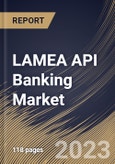The introduction of APIs has increased market competition, which has benefited customers. Due to this, the financial industry's prices are decreasing relative to the multitude of services offered. For instance, users can use aggregators of financial services to compare offers from banks and other institutions. Additionally, they now have access to facilities that were previously only available in branches.
API in banking is expanding its product portfolio by enabling them to offer complementary products, like insurance or products co-created with its partners and financial technology and innovation firms. This portfolio expansion is feasible due to the adaptability of APIs that connect to diverse frameworks and facilitate exchange between businesses and industries.
The accelerated digital transformation of the banking and financial services sector is a significant force propelling the API banking industry. Banks increasingly employ API to facilitate seamless integration with third-party applications, enabling them to provide innovative digital services and improve customer experience. Additionally, open banking regulations drive the adoption of API banking. These regulations require banks to expose their consumer data and payment infrastructure via APIs, which promotes competition, innovation, and collaboration among traditional banks and FinTech companies. In addition, enhanced customer experience accelerated market growth significantly. API permits banks to offer customized and individualized services to their consumers.
The Central Bank of Brazil is developing an open banking architecture enabling consumers to grant access to their financial data to banks, digital banks, and fintech companies offering enticing services. The National Bank of Rwanda has codified the method for mining and analyzing customer data, and the financial technology market in Rwanda is expanding. In Nigeria, API standards for use with bill payments, ATMs, direct debit, transaction histories, and other scenarios are being developed. In light of these factors, the market in LAMEA is anticipated to grow.
The Brazil market dominated the LAMEA API Banking Market by Country in 2022, and would continue to be a dominant market till 2030; thereby, achieving a market value of $3,078.1 million by 2030. The Argentina market is showcasing a CAGR of 31.7% during (2023-2030). Additionally, The UAE market would register a CAGR of 30.6% during (2023-2030).
Based on Component, the market is segmented into Solution and Service. Based on Deployment, the market is segmented into On-premise and Cloud. Based on Enterprise Size, the market is segmented into Large Enterprises and Small & Medium-sized Enterprises. Based on countries, the market is segmented into Brazil, Argentina, UAE, Saudi Arabia, South Africa, Nigeria, and Rest of LAMEA.
The market research report covers the analysis of key stake holders of the market. Key companies profiled in the report include Google LLC (Alphabet Inc.), BankProv (PROVIDENT BANCORP, INC.), TIBCO (The Information Bus Company) Software. Inc., FidyPay (Jambopay Express Pvt Ltd), Oracle Corporation, Razorpay Software Private Limited, Infosys Limited, IBM Corporation, SAP SE and Salesforce, Inc
Scope of the Study
By Component
- Solution
- Service
By Deployment
- On-premise
- Cloud
By Enterprise Size
- Large Enterprises
- Small & Medium-sized Enterprises
By Country
- Brazil
- Argentina
- UAE
- Saudi Arabia
- South Africa
- Nigeria
- Rest of LAMEA
Key Market Players
List of Companies Profiled in the Report:
- Google LLC (Alphabet Inc.)
- BankProv (PROVIDENT BANCORP, INC.)
- TIBCO (The Information Bus Company) Software. Inc.
- FidyPay (Jambopay Express Pvt Ltd)
- Oracle Corporation
- Razorpay Software Private Limited
- Infosys Limited
- IBM Corporation
- SAP SE
- Salesforce, Inc.
Unique Offerings
- Exhaustive coverage
- The highest number of Market tables and figures
- Subscription-based model available
- Guaranteed best price
- Assured post sales research support with 10% customization free
Table of Contents
Companies Mentioned
- Google LLC (Alphabet Inc.)
- BankProv (PROVIDENT BANCORP, INC.)
- TIBCO (The Information Bus Company) Software. Inc.
- FidyPay (Jambopay Express Pvt Ltd)
- Oracle Corporation
- Razorpay Software Private Limited
- Infosys Limited
- IBM Corporation
- SAP SE
- Salesforce, Inc.








